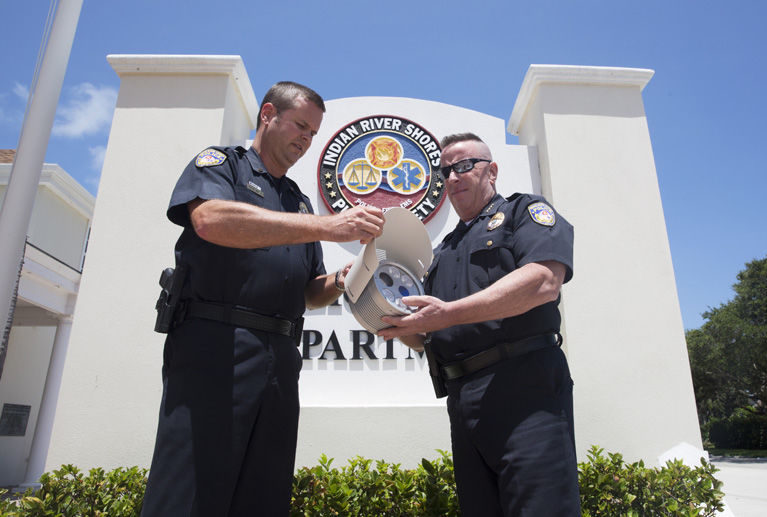
INDIAN RIVER SHORES — While the Town of Indian River Shores tweaks some technical glitches with its new $70,000 license-plate reader camera system, the capabilities of the cameras and possible unintended consequences bring up serious questions for public safety managers.
The two camera devices, each one capturing images of vehicle tags entering and leaving the Town on A1A, are designed to link to the Florida Division of Law Enforcement database, meaning that Shores officers will be able to see any warrant, violation or alert associated with the vehicle or its occupants – in real time – and the Town’s stated policy dictates that, upon a “hit” on the system, officers are to attempt to locate the vehicle whenever possible.
The first question that comes to mind is whether or not this heightened intelligence might wind up skewing Indian River Shores’ crime rate upward in the future. The Shores was recently named the “Safest City in Florida” for 2015 and Police Chief Rich Rosell has vowed to keep it that way under his watch. But, on paper, might it look like more crime is happening in the well-heeled enclave of mostly gated, luxury club communities if police are stopping and arresting people wanted elsewhere?
Lt. Mark Shaw doesn’t think so. He said he doubts there will be a marked uptick in the Shores’ crime rates, in part because Town officials are banking on the deterrent effect of the cameras’ existence – that people with criminal warrants, expired tags, revoked driver licenses or other issues that would jolt the camera system into action will just find another route and stay out of town. Secondly, if the Shores does make an arrest based upon a warrant in the national database, the crime already occurred somewhere else.
“Say if we stop someone who has a warrant and we find that they have stolen property or property we have probable cause to think was stolen, that would just go back to whichever agency has the original case of the theft,” Shaw said.
He noted that even without the cameras, Shores officers have in the past recovered stolen property from criminals so bold as to leave store security tags on all the merchandise.
If drugs or unregistered firearms are found in a vehicle Shores police have reason to stop and search based upon information returned via the camera system, it might appear that the Town has experienced a slight increase in drug or contraband activity, however.
At the same time, the camera system could provide benefits to the larger community and to Shores residents that the average person might not immediately think of. Whenever an Amber Alert for a missing child or a Silver Alert for a missing senior citizen is issued with vehicle information or suspected vehicle information, those details are also at officers’ fingertips on their onboard computer systems. Meaning that if an elderly person with dementia gets in a car and drives off, they could be found quickly if they drive through the Town of Indian River Shores.
Despite the deterrent factor and the possibility that the cameras have been touted as a valuable tool for solving crimes after they occur, the Big Brother factor is not lost on criminal defense attorneys like Andy Metcalf. Metcalf, a long-time Vero Beach lawyer and president-elect of the Florida Association of Criminal Defense Lawyers, says he thinks the license-plate readers are more than a bit heavy-handed for a community like the Shores.
“To me, it’s just overkill. If it’s used for its intended purposes there is a value to it, but if it’s abused by those who use it, it’s going to have a chilling effect,” Metcalf said. “In our community, it seems to be a waste of resources, Indian River County is not a hotbed of criminal activity and I can see why some Indian River Shores residents might not like the idea of their comings and goings being monitored this way by these cameras. Why do we need a police state here?”
Rosell, who has more than 30 years of law enforcement experience at the local and state level, in the process of getting the Town Council approval, promised there would be safeguards against such abuse.



